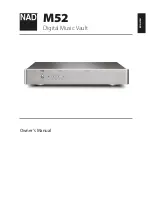
Consult the mower operators manual for proper
adjustment procedures.
2.
When arriving at area to be mowed, remove
safety strap and lockup pins and approach area
with mowers in transport position.
3.
Push the control levers downward to lower
the mowers with frame in motion to eliminate
possibility of spinning tractor drive wheels on the
turf causing turf damage. Use the diagram on
top of the control panel as a guide to lowering
mowers (
g012764
Figure 18
1.
Cutting unit 1
4.
Cutting unit 4
2.
Cutting unit 2
5.
Cutting unit 5
3.
Cutting unit 3
Important:
Make sure that no persons
are working on or near the mowers before
raising or lowering.
4.
It usually works best to mow the outer portion
of the area first, then work your way to the
center. Down shift the tractor prior to climbing a
steep incline to eliminate the need to downshift
halfway up which could cause tire slippage and
turf damage. Do not raise the mowers above
halfway while operating on severe hillsides or
tractor and frame stability may be affected. Do
not accelerate when making a turn on turf area.
This will cause the tires to damage the turf.
5.
Vary the mowing speeds to match the terrain
conditions. Slow down in rough terrain
conditions to keep the mowers from bouncing.
Never exceed 9.7 km/h (6 mph). Traveling
too fast can cause mechanical damage to the
mowers and does not significantly increase the
overall efficiency. Mowing at 6.4 to 9.7 km/h (4
to 6 mph) produces the finest turf appearance.
6.
Reverse the direction of travel each time an
area is mowed. This reduces a grain condition
in the turf where the grass tends to grow in the
direction of mower travel. Occasionally mowing
at 90 degrees to the usual mowing direction will
also contribute to reducing the condition.
7.
Reduction in compaction of the soil and turf can
be achieved by occasionally leaving one or two
of the outboard mowers in the transport position
while mowing the periphery of the mowing
area. This offsets the tractor and mower wheel
tracks from the previous mowing and prevents
operating in the same path continuously. On
golf courses, cross cut each end of the fairway
at the tee and green to reduce the amount of
travel at these locations. Considerable traffic
is concentrated in these areas by golfers and
carts. Any reduction in travel by the mowing
equipment is beneficial to the turf.
8.
When mowing around obstacles such as trees,
etc., one or more cutting units may be raised to
narrow overall width.
After Operation
After Operation Safety
General Safety
•
Park the tow vehicle and machine on a firm, level
surface; shut off the engine, remove the key, and
wait for all moving parts to stop before adjusting,
repairing, cleaning, or storing the machine.
•
Only disconnect the machine from the tow vehicle
while on a level surface.
•
When disconnecting the machine, always chock
the wheels to prevent movement.
•
Keep all parts of the machine in good working
condition and all hardware tightened.
•
Replace all worn, damaged, or missing decals.
Towing Safety
•
Before towing the machine, check with your
local county or state safety towing regulations, in
addition to meeting Department of Transportation
(DOT) Safety Towing Regulations.
•
Tow only with a machine that has a hitch designed
for towing. Do not attach towed equipment except
at the hitch point.
17












































